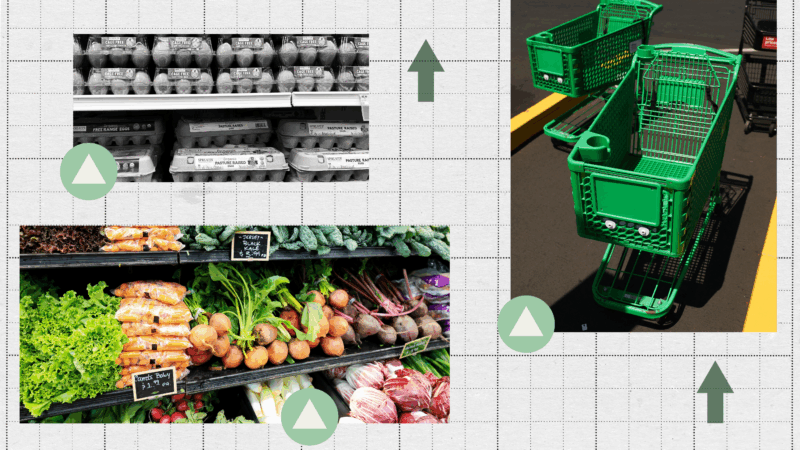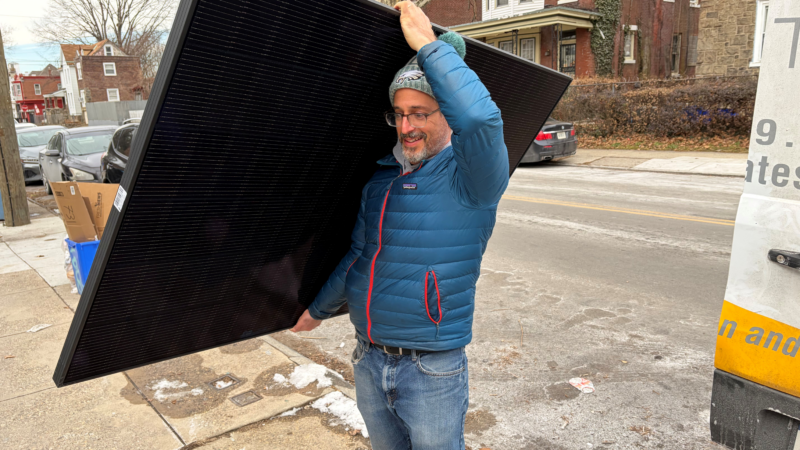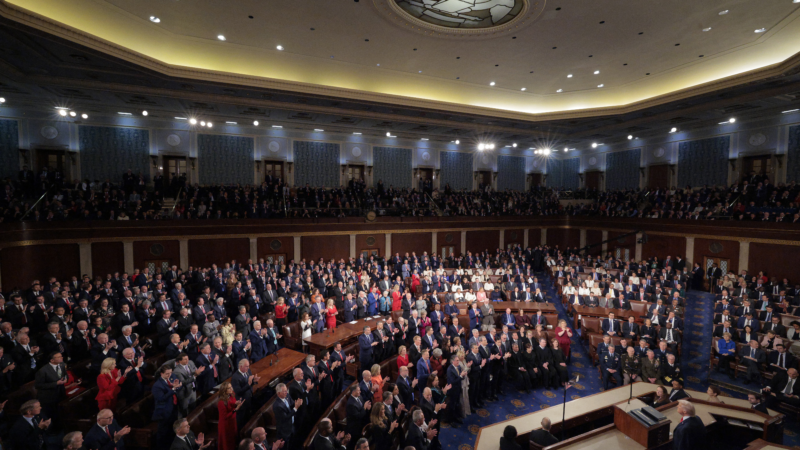Grocery prices have jumped up, and there’s no relief in sight
NPR’s series Cost of Living: The Price We Pay is examining what’s driving price increases and how people are coping after years of stubborn inflation. How are higher prices changing the way you live? Fill out this form to share your story with NPR.
What’s the item?
Groceries
How has the price changed since before the pandemic?
Up 29% since February 2020, according to the Bureau of Labor Statistics.
Why have prices gone up?
The pandemic initially snarled supply chains as restaurants were shuttered and consumers suddenly had to prepare three meals at home each day. That was compounded in 2022 by Russia’s invasion of Ukraine, which raised food prices around the world. Avian flu added to the more recent spike in egg prices. And now President Trump’s tariffs are pushing up the price of imported foods like bananas and coffee.
Last month saw the biggest jump in grocery prices in almost three years. For Shelia Fields, who lives in Galveston, Texas, the hunt for affordable food has almost become a full-time job.
“Like yesterday, we went to three different stores here in town. And we bought only what was a really good sale,” Fields says. “So we got no meat at all. Because it’s just too high.”
Fields and her husband are both retired nurses, and they’re worried about outliving their savings.
“We’re not going hungry,” she says. “We just have anxiety over this. And anxiety about our kids and our grandkids. … We’ve been through a lot of recessions. We’ve been through one in the ’80s and 2008. And this is the scaredest we’ve ever been.”

Fields and her husband are in good company. A survey this summer by The Associated Press and NORC found the cost of groceries has become a major source of stress for just over half of all Americans — outpacing rent, health care and student debt.
What are people doing about it?
Rebecca White, who works at a bank in Cincinnati, says her paycheck has not kept pace with her rising grocery bills. She’s scouring the back of her cupboards for food and eating a lot of spaghetti.
“I try to stick to cheaper meals, which isn’t always healthy,” White says. “Sometimes I’ll skip breakfast and then just have lunch and dinner so that I don’t have to buy another meal.”
The giant Kroger supermarket chain says the stress is apparent as shoppers make smaller, more frequent trips to the store, use more coupons, and opt for cheaper private-label products.
White says she’s not optimistic about finding relief at the checkout line any time soon.
“Once prices go up, they rarely if ever come back down,” she says.
The double-digit price hikes triggered by the pandemic and Russia’s invasion of Ukraine came as a shock after decades of relatively stable grocery prices. And shoppers are reminded of those higher prices week after week.
“We all have to eat. And food is very personal,” says David Ortega, a food economist at Michigan State University. “Grocery prices have become a hot-button political flash point over the past couple of years.”
President Trump has said repeatedly that shoppers’ frustration with grocery prices helped put him back in the White House.
“Groceries went through the roof. And I campaigned on that,” Trump told a White House audience in April.
Despite Trump’s promise to lower prices, the overall cost of groceries is higher now than when he was sworn in. The president’s crackdown on illegal immigration — including targeting people who pick and process our food — could add to upward pressure on prices. Trump’s tariffs are also contributing to higher prices for imported staples like bananas and coffee.
“Tariffs are simply a tax on imported goods,” Ortega says. “So that raises the cost, and ultimately consumers see that at the grocery store.”
Coffee prices have jumped more than 20% in the last year. And while some of that is due to weather in coffee-growing countries like Brazil and Vietnam, Trump’s double-digit import taxes are not helping.
Shelia Fields stocked up on coffee when the tariffs were announced in midsummer. She’s not sure what she’ll do when that supply runs out.
“We have not bought coffee in a month and the prices are going up, up, up,” she says with a rueful laugh. “We’re down to like one cup in the morning. And I just hate to give that up.”
When a horse whinnies, there’s more than meets the ear
A new study finds that horse whinnies are made of both a high and a low frequency, generated by different parts of the vocal tract. The two-tone sound may help horses convey more complex information.
Trump’s many tariff tools mean consumer prices won’t go down, analysts say
The Supreme Court struck down President Trump's signature tariffs. But the president has other tariff tools, and consumers shouldn't expect cheaper prices anytime soon, economists say.
Hundreds of American nurses choose Canada over the U.S. under Trump
More than 1,000 American nurses have successfully applied for licensure in British Columbia since April, a massive increase over prior years.
Tax credits for solar panels are available, but the catch is you can’t own them
Rooftop solar installers are steering customers toward leases instead of purchases. Federal tax credits for purchased systems have ended but are still available for leased ones.
5 takeaways from Trump’s State of the Union address
President Trump hit familiar notes on immigration and culture in his speech Tuesday night, but he largely underplayed the economic problems that voters say they are most concerned about.
China restricts exports to 40 Japanese entities with ties to military
China on Tuesday restricted exports to 40 Japanese entities it says are contributing to Japan's "remilitarization," in the latest escalation of tensions with Tokyo.







